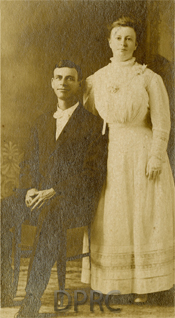“We board the schooner Fearless for Nassau,” penned Carl M. Padgett in his journal entry dated December 31, 1909. The 27-year-old Padgett was embarking with Robert M. and Ida Evans on their missionary voyage to the Bahamas. Having stopped in Miami after the long journey by wagon from their home in Durant, Florida, the couple welcomed the young Padgett to join their ministry team. The Evanses were on their way to join Edmond and Rebecca Barr, who already had sailed for his homeland the previous November. Together these five became the first members of the Church of God to take the gospel outside the United States.
Carl Padgett’s journal records the life of a hard-working, faithful minister. Prior to traveling to the Bahamas he lived in Miami, where his father, Milton, served as pastor. Carl’s journal describes summer work plowing and planting on their farm and winter labor as a janitor. The journal also reveals that the return of Christ was a frequent theme in his preaching.
No doubt ministering in a foreign country was an exciting adventure for the young Padgett. Once in Nassau, tents, the sponge exchange, and private homes served as preaching stations in the towns and villages they visited.
In March 1910, Padgett received the baptism in the Holy Spirit. A year later he reflected on his experience: “The year has had its attendant trials, but . . . it has been the best year of my life. How near the Lord has been to me. . . . And now I want to live for the glory of my Lord. Do I think that I will be good, do I think that I will live holy? No. I have tried it and proved a failure. In my nature was vileness, but the Lord took it out, and by His grace and power I do live holy; by His power I can overcome.”
In November 1910, Padgett returned home to Miami for a few weeks. The next January he joined the Pentecostal Worldwide Mission Band, made up of Church of God ministers using Bibles and musical instruments to spread the gospel. In February the band journeyed to the Bahamas. Going from town to town they played their instruments to attract a congregation to hear them preach. Already familiar with the islands, Padgett was a natural leader when the band divided into smaller ministry teams. He also practiced diligently to learn to play the coronet.
Returning to Miami in April 1911, Padgett ministered throughout south Florida. He organized the Church of God Evangelistic Band “for the purpose of traveling from place to place to lift up Jesus.” He also stayed in touch with events in the Bahamas through correspondence with R.M. Evans and Edmond Barr. On August 14 he recorded, “Wrote to Brother Barr and sent one dollar to help him.”
When R.M. Evans became ill in 1913, the Church of God appointed Carl Padgett overseer of the Bahamas for that year. For most of the next four decades he served as pastor of congregations in Florida and Georgia. Yet, his early experience as a pioneer missionary to the Bahamas frequently drew him back to ministry in the islands as he endeavored to lift up Jesus.
———————————————–
This article was written by Church of God Historian David G. Roebuck, Ph.D., who is director of the Dixon Pentecostal Research Center and assistant professor of the history of Christianity at Lee University. This “Church of God Chronicles” was first published in the January 2010 Church of God Evangel.
